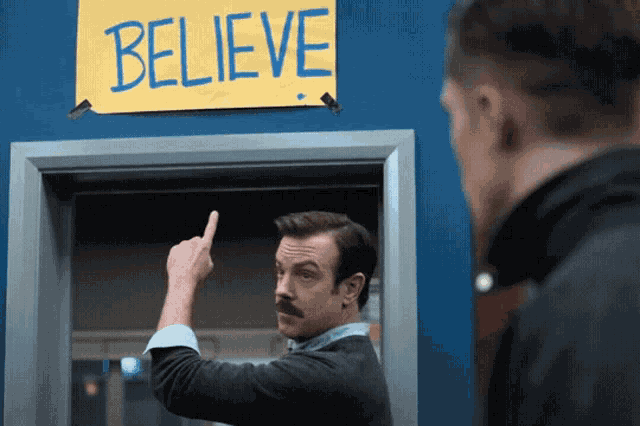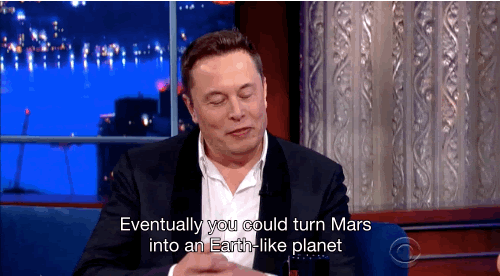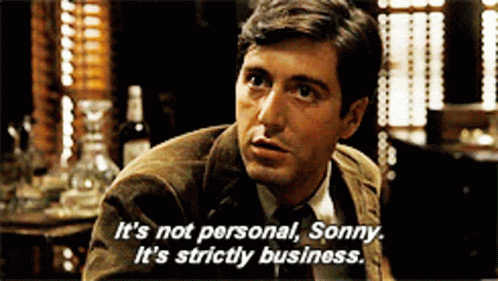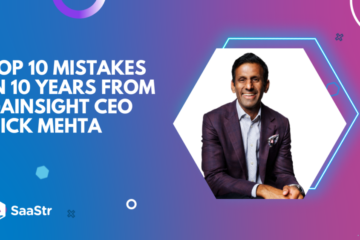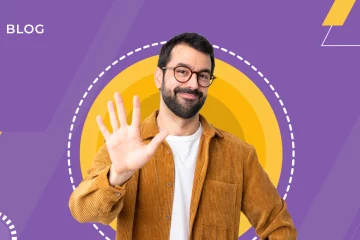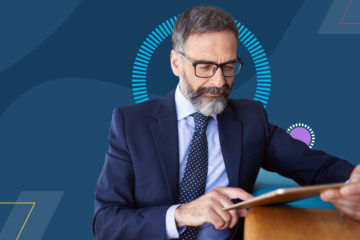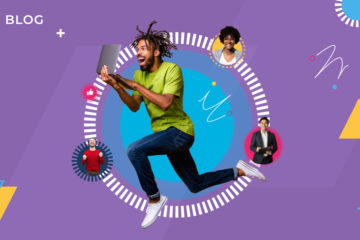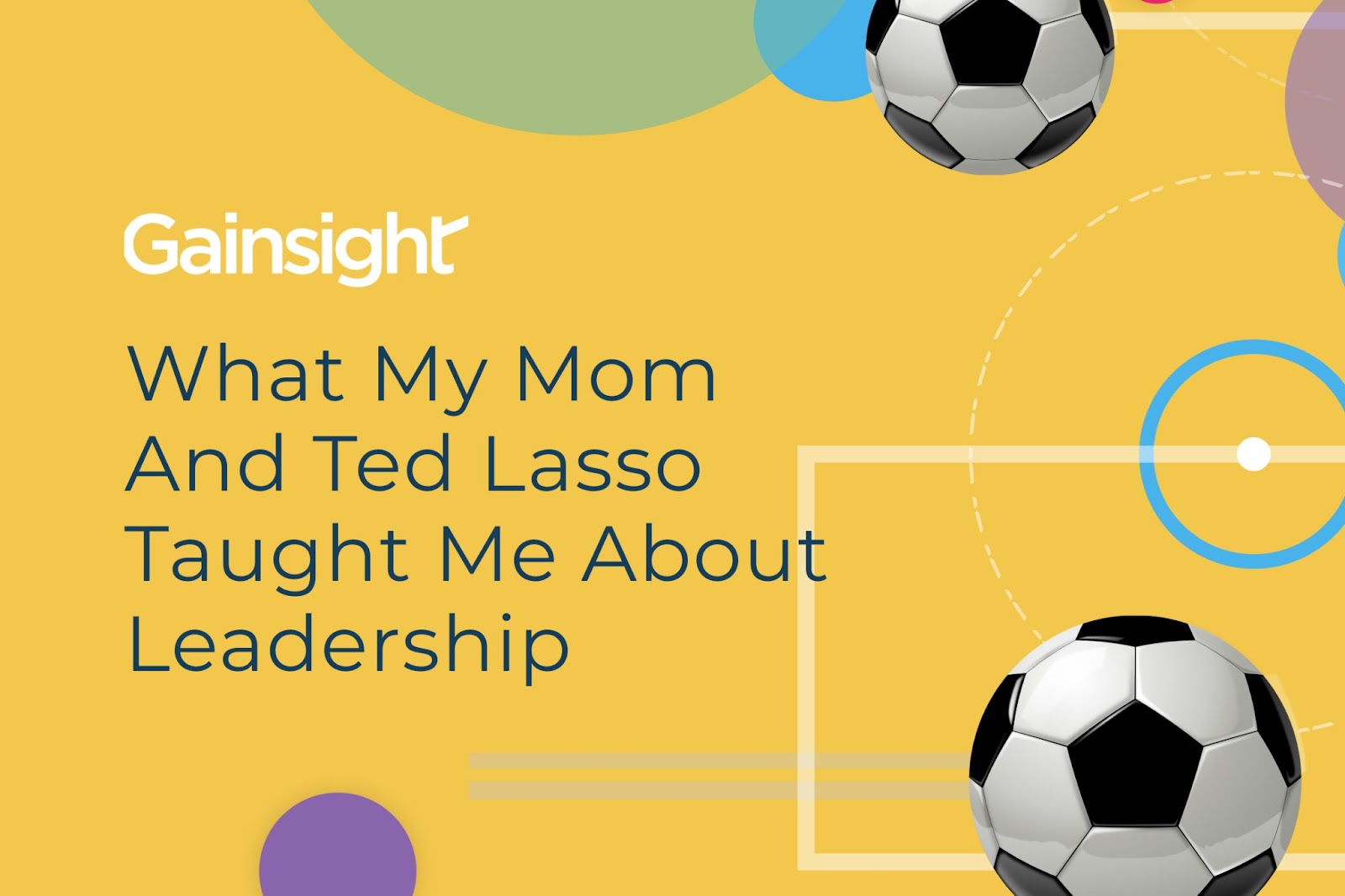
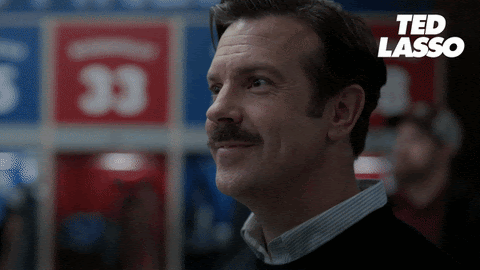
I know what you’re thinking. What do Ted Lasso and my mom have to do with leadership? Or worse, you might be asking, “Who is Ted Lasso?” Spoiler Alert! If you haven’t seen Ted Lasso yet, stop reading and subscribe to Apple+, so you can watch the best. Show. Ever.
Ted Lasso (portrayed by Jason Sudeikis) is a US football coach who travels to England to coach a British “football” (let’s be honest – it’s soccer!) team. He does this even though he knows very little about European football – he gets by as the new coach mostly by staying optimistic and caring for his team. As such, I (and millions of other humans) find his leadership style to be beyond inspiring. But before Ted Lasso was my role model, like many people, it was my parents that inspired me.
Family Dinner With The Costanzas
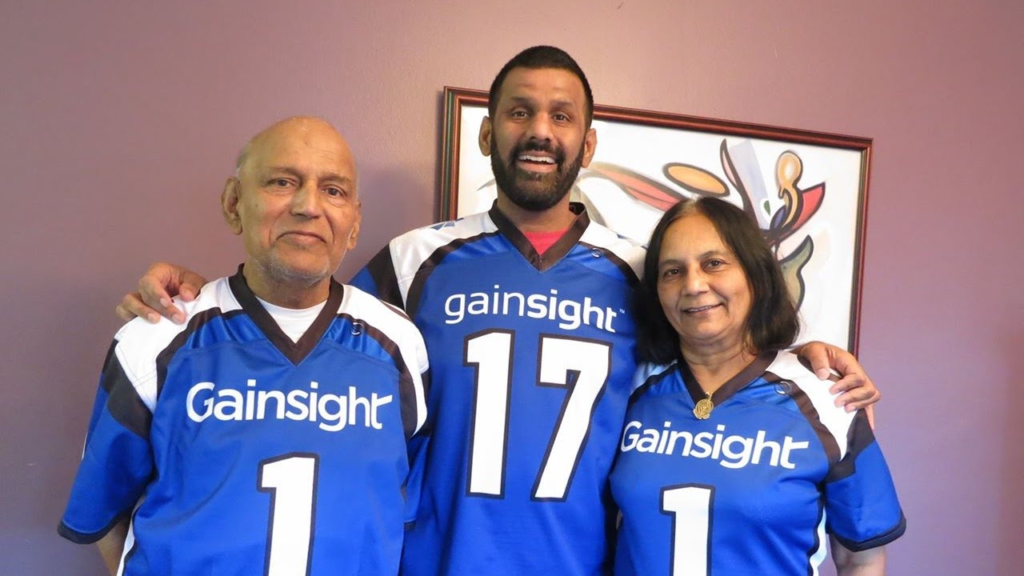
The year is 2017, I took my mom and dad (both in their 70s) out to dinner. It was a big night out, so of course, we went to P.F. Chang’s. Two things to know about my mom: She is a science nerd, as am I (don’t get me started about the parallels between SaaS TAM and quantum physics), and she can be extremely direct.
As we drove to the restaurant, she looked at me and said, “Nick, it’s too bad you didn’t go into science, you really could have done something with your life.” Now, my dad, a business-minded person, tried to smooth things over with his perspective by saying, “Meena – he’s only 40 – he still has time to do something with his life.” Without missing a beat, my mom replied, “No – he’s too old – but maybe his kids can do something with their lives.”
While this story certainly illustrates my George Costanza-like childhood, it also sent me, and Gainsight, down a path of self-exploration. I don’t know if you’ve ever had your career choices existentially questioned by your mom, but it got me thinking: What is the purpose of what I do? What is the purpose of Gainsight? What is the purpose of Customer Success? Sure, we build enterprise software, and our software is great, but we’re not traveling to Mars or curing COVID. So, what am I doing with my life? Why do we do what we do every day?
Start With Why
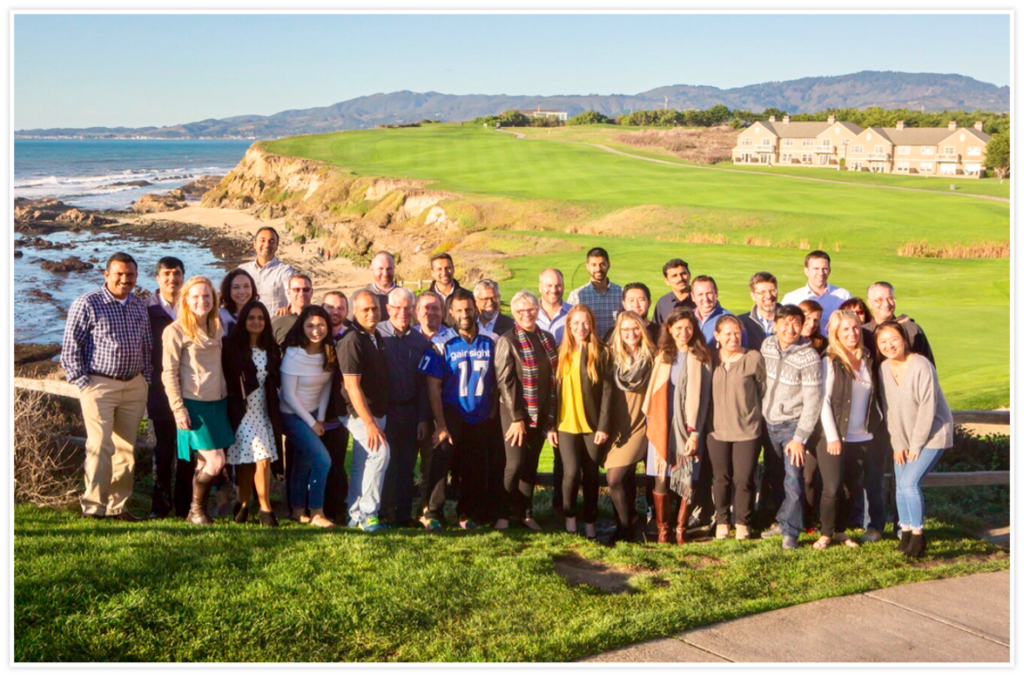
Shortly after that dinner, Gainsight held a leadership offsite at the Ritz Carlton in Half Moon Bay (the kind of location decision you make before you learn about financial discipline). We forced ourselves to answer the big question: What is our purpose? We started by reading Scaling Up. If you haven’t read it, it’s a practical book that helps you define your purpose, values, goals, and everything else needed for a growth-stage company.
There is a section in the template from Scaling Up that says, “Purpose: Define the reason why your company exists – not what you do, but why you do it.” Some of you may recognize this phrase, originally canonized by Jim Collins in the book Good To Great. He asks readers: What’s the purpose of what your company does? So we sat there for a while thinking. Customer Success software will help companies retain their customers, but, for us, that honestly wasn’t enough. We wanted something more.
Now, we’re not SpaceX; we’re not moving humanity to Mars. We are not Moderna making a vaccine for COVID. We’re not even Apple producing Ted Lasso. So what is the purpose of what we do?
What we realized is Gainsight was never the kind of company that was just about the bottom line or building software. We reflected on the fact that we are a very values-driven company with some quirky choices:
- Childlike Joy: Bringing your inner child with you to work every day.
- Shoshin: Adopting a beginner’s mind.
- Stay Thirsty, My Friends: Believing in an internally-driven strive for greatness (hat tip to “The Most Interesting Man in the World”).
- Success for All: Achieving success for all of our stakeholders – clients, partners, community, investors, teammates, and their families and friends.
- Golden Rule: Trusting the intentions of others.
Most people believe the way to be successful in business, as Michael Corleone says in The Godfather, is not to make anything personal, to make it strictly about business.
Indeed, the world has hammered into us all:
“It’s just about the bottom line.”
“People are just assets.”
“It’s just about closing the deal.”
“Emotions only get in the way.”
Whether you believe it or not, we’ve all heard these stories over and over again; the best way to be successful in business is to be less human. At Gainsight, we thought, “maybe there’s a different way to win?” Which led us to create our purpose:
“To be living proof that you can win in business while being human-first.”
Our core motivation was the idea that we are human beings first, and business people second. We are human beings first, and customers second. We are human beings first and CEOs second. We sometimes miss the fact that all of these companies exist to serve human beings.
I Believe In Hope
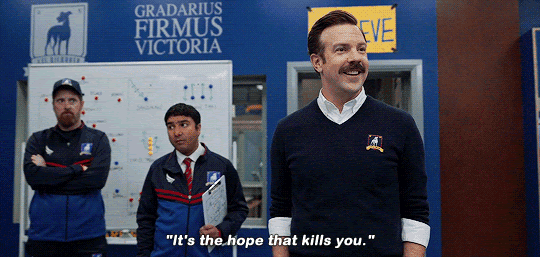
The past 24 months have highlighted the fact that companies don’t live in a vacuum. Two years ago, I wrote The World Needs Human-first CEOs, Not War-time CEOs. Many people thought that with COVID and all of the dislocation, we were headed into war and should prepare for battle. The reality was, and still is, we all need less fighting and more empathy.
The person I find who most exemplifies empathy and optimism is Ted Lasso. Just like Ted, I, and every other Gainster, try to think about our stakeholders as human beings first. Here are just a few lessons on how to be human-first that we’ve learned from Ted.
Customers = Humans
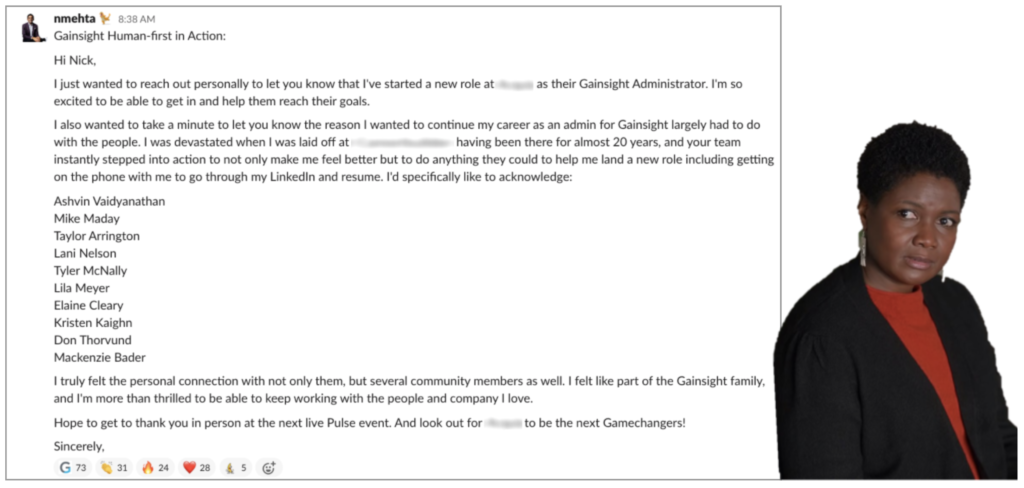
We all face job changes. It’s been exceptionally common in the last couple of years and is something we can all empathize with. Recently, one of our customers reached out to me. They had been laid off from a previous job when they were a client of ours. This individual was so grateful and wanted to thank every Gainster that had mobilized to help this individual find a new role at a new company. Just like Dr. Sharon Fieldstone (the psychologist in Ted Lasso) helps every team member, we want to help every member of our community by thinking of them as humans first, and customers second.
(Churned) Customers = Humans

It was hard when Jamie Tartt (the star football player) left Ted Lasso’s team, but later in the series, Ted accepted him back on the team. Similarly, it was hard for us at Gainsight when a longtime client hired a new executive who then decided to churn our partnership. Two weeks later, this same executive emailed me, letting me know they had been laid off. Even though we hadn’t spoken since their decision to churn, I immediately picked up the phone to introduce this person to several job opportunities. This isn’t to say anything special about me; this just reflects what we all should be doing. This individual is a human being first and a churned customer second.
Teammates = Humans

What about our teammates? We’ve all been in situations where we’ve seen colleagues being mistreated, whether it’s by peers, or in this case, a customer. I believe in Customer Success, but I believe in being human-first even more. Similarly to when everyone stood up for Nathan Shellye (a junior manager in Ted Lasso – putting aside what later happens in the show!), we have to do what is right and stand up for our teammates as well. We do that even if that means losing a customer (luckily, we didn’t in this case).
Alumni = Humans

When Roy Kent (veteran football star) leaves the team, everyone’s hearts are broken. When he later decides to come back as a coach, they all welcome him with open arms. The same goes for people leaving your company. Too frequently, when someone leaves a company, they are treated as if they no longer exist. Too often, people adopt a “we’re not going to talk about that person anymore” mentality. At Gainsight, we’re excited to celebrate our teammates when they get new opportunities. Any time someone leaves and posts on LinkedIn, I thank them for their contributions and congratulate them on their new role. Alums are human beings first.
Families = Humans
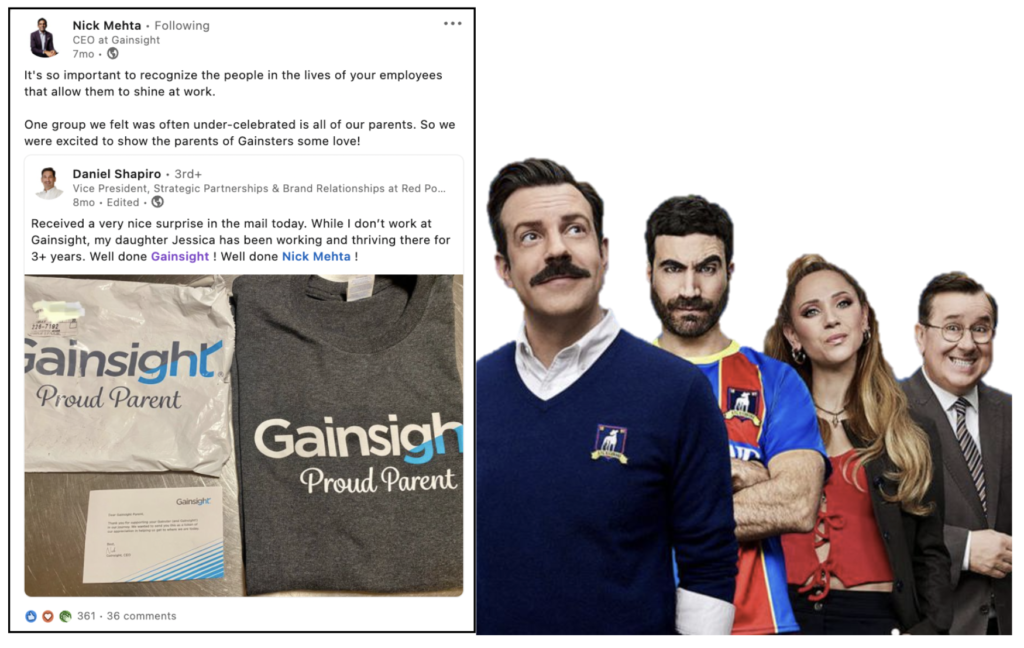
The same empathy and support we show each other extends to all human beings, including the families and friends of our teammates. My parents always have and continue to inspire me. At Gainsight, we felt one group that deserved more recognition was our parents. To show our appreciation, we sent swag to the parents of our teammates after a big milestone for our company. Much like it takes every team member supporting each other in Ted Lasso, it takes the love and support of our families and friends to help us become the human beings we are today.
Community = Humans
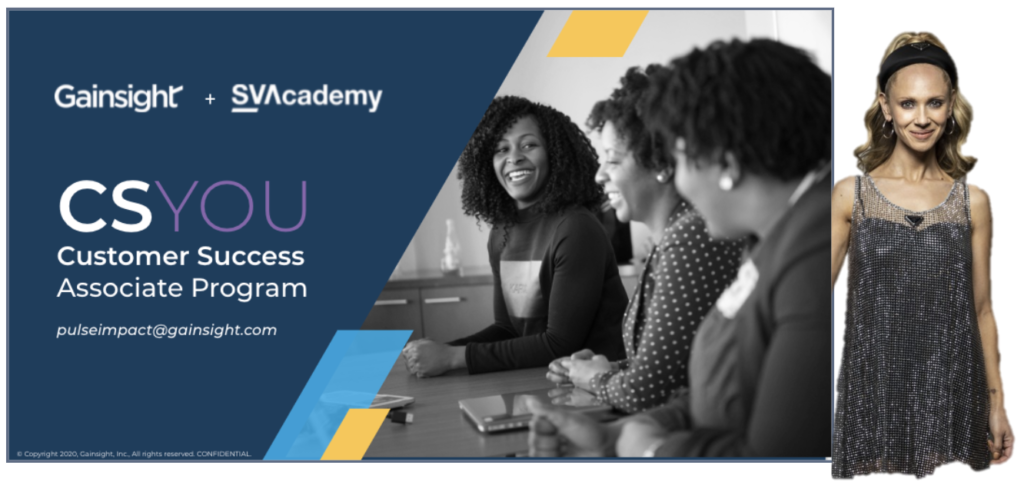
Being human also means helping others throughout our communities. Like Keeley Jones (public relations consultant in Ted Lasso) tries to make a difference in her community, we try to have a positive impact on the Customer Success community in a small way, which is why we created the CS YOU program, in partnership with SV Academy. CS YOU is designed to create an equitable talent pipeline and bring underrepresented groups into the Customer Success profession through highly focused education, training, and internships in the tech industry.
Leaders = Humans
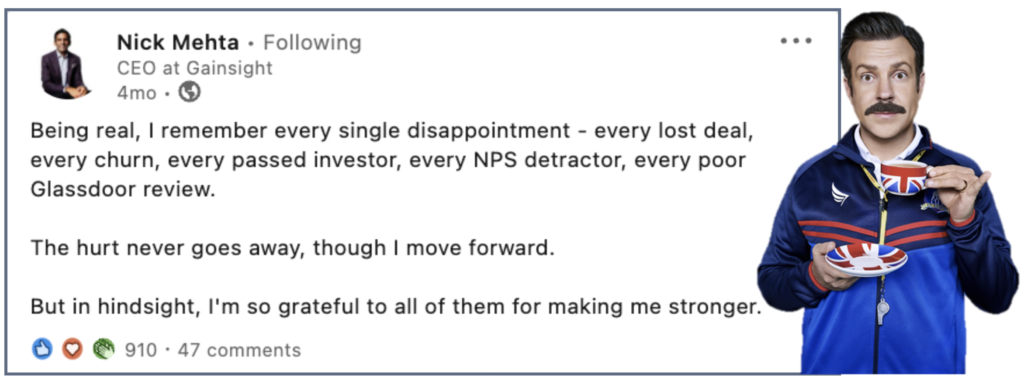
Being human-first applies to leaders as well, like me. A while back, I shared how I remember every single disappointment. Whether it’s a lost customer, a negative Glassdoor review, a poor NPS, losing a deal, or a passed investor, the hurt never goes away. Ted Lasso’s genius is that the show portrays real-world mental health challenges right alongside the infectious optimism of the cast. Many leaders struggle with these issues, including me. Leaders are human beings first, even if they don’t always act the part.
Board = Humans too!
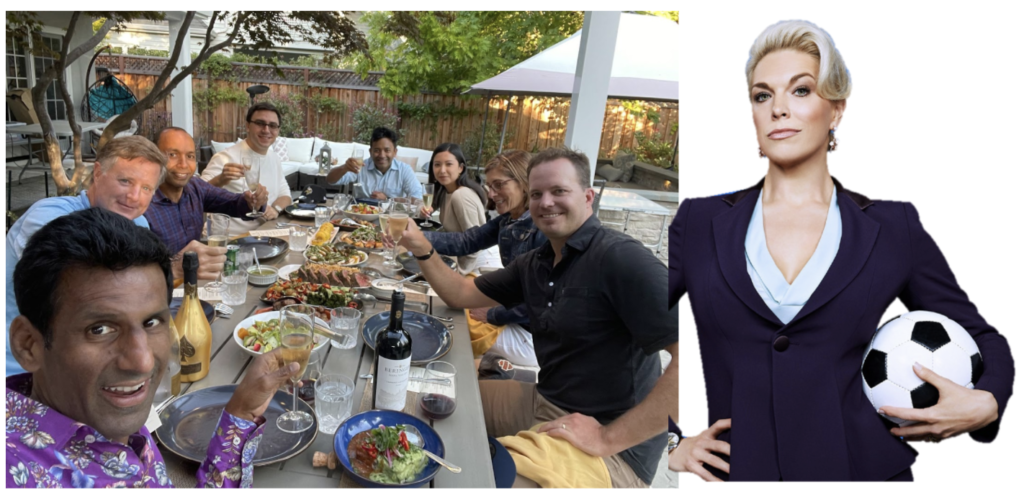
That extends to our boards as well. Although they have a job to do, they are human beings first, like Rebecca Welton (team owner and Ted’s boss). While Rebecca may be perceived as the antagonist at times, she’s also a human being. And her humanity comes out more and more as the show progresses. The same is true about the investors in our companies, if we give them the space and encouragement to share. The above photo is of me and my current Board of Directors, right after I asked our group icebreaker, stolen from Ted in the show (“first concert, best concert – go!”). And you know, what? People really opened up. Yes I said it – VCs are people too!
I Believe In Believe
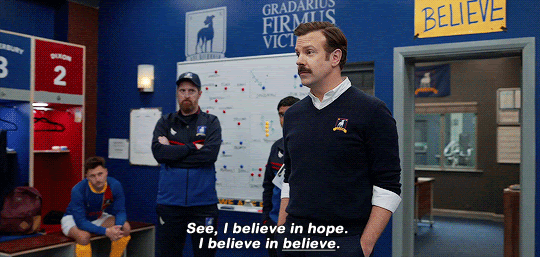
I challenge all of you to ask yourself: “How many conversations have I had in the last week with the human beings that make up my customers, team, leaders, or board?” Not just talking about the deal or the renewal or project roadmaps, but really getting to know them as human beings.
Recently, I was talking with one of our clients who had just lost his wife to a long battle with brain cancer. While it was so hard for me to hear, I was incredibly grateful that he was vulnerable enough to share with me. A few weeks ago, a teammate I was speaking with broke down because of the mental health issues they were dealing with. Last month, I caught up with an alum who felt misled about the job they took after Gainsight, and I was helping them think through their next opportunity. Though each one was hard to hear, I am so grateful to have real conversations.Doesn’t it feel great to push through the “we are crushing it” phase of business conversations and talk about what’s really happening – good and bad?
I understand it’s easy to read this and be cynical – it’s easy to say, gosh, Nick, it’s really just about the bottom line. It’s just about closing deals. It’s about getting to 3x revenue. I ask you: how does that cynicism serve you? What is it doing for you? Is it really helping you? Is it limiting the possibilities? Is it holding you back? Is it preventing you from being able to believe?
Ted Lasso teaches us that cynicism is what holds us back. It holds us back from being the best versions of ourselves. It holds us back from believing in each other’s potential. It holds us back from BELIEVING. If there’s anything Ted Lasso and my mom taught me, it’s that a little bit of belief goes a long way.
